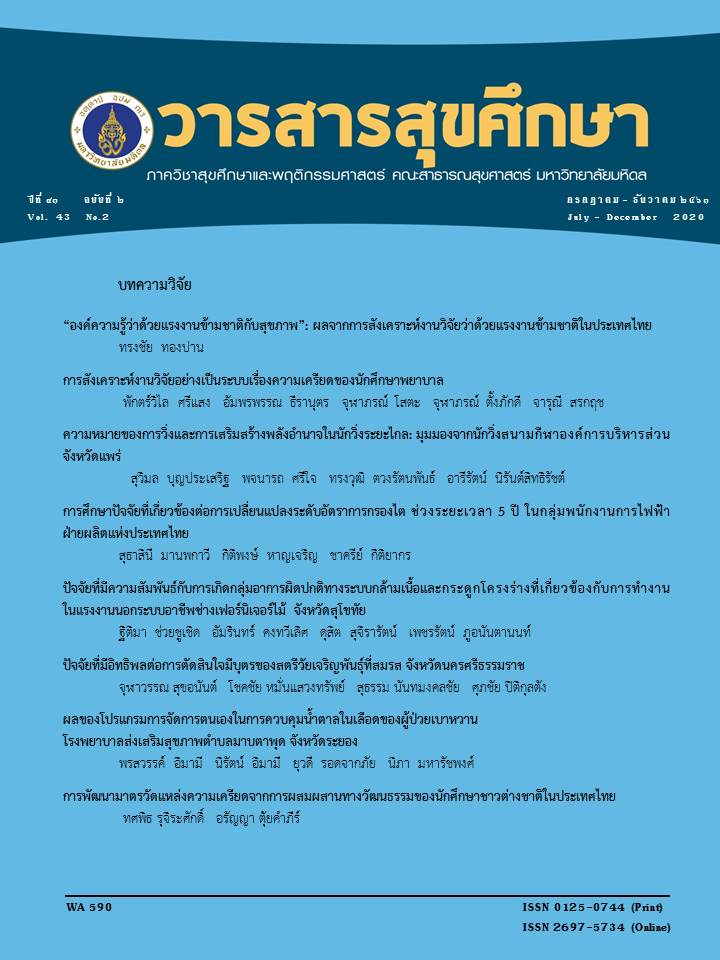Clinical Factors, Social Support, Treatment Satisfaction, and Quality of Life among Renal Transplant Recipient
Keywords:
Kidney Transplant Recipient, Quality of Life, Social Support, Treatment SatisfactionAbstract
Quality of life among kidney transplant recipients needs public health attention. This cross-sectional study aimed to compare the quality of life among kidney transplant recipients, patients with chronic kidney disease, and general population and to identify factors related to the quality of life among kidney transplant recipients. The study samples were selected according to eligible criteria from Siriraj Hospital from Nov 2016–Mar 2017. Data were collected by a self-administered questionnaire and reviewed medical records. The questionnaire had 4 parts comprising general characteristics, KDQOL-SFTM, social support, and treatment satisfaction of kidney transplant recipients.
Kidney transplant recipients had the lowest quality of life when compared with patients with chronic kidney disease and general population (p<0.001). Multivariable linear regression models found higher treatment satisfaction (B=0.116, p=0.002) significantly increased quality of life. However, unmarried (B= -11.844, p<0.001) and hypertension (B= -18.473, p<0.001) reduced the quality of life. In conclusion, enhancing treatment can improve quality of life among kidney transplant recipients by improving treatment efficacy.
References
Jensen CE, Sorensen P, Petersen KD. In Denmark kidney transplantation is more cost-effective than dialysis. Dan Med J. 2014;61(3): A4796. PubMed PMID: 24814915. Epub 2014/05/13. eng.
Neri L, Dukes J, Brennan DC, Salvalaggio PR, Seelam S, Desiraju S, et al. Impaired renal function is associated with worse self-reported outcomes after kidney transplantation. Qual Life Res. 2011 Dec;20(10):1689-98. PubMed PMID: 21479956. Epub 2011/04/12. eng.
Tamura Y, Urawa A, Watanabe S, Hasegawa T, Ogura T, Nishikawa K, Sugimura Y, Komori T. and Okada M. Mood Status and Quality of Life in Kidney Recipients After Transplantation. Transplantation Proceedings 2018;50(8):2521-2525.
Costa JM, Nogueira LT. Association between work, income and quality of life of kidney transplant recipient the municipality of Teresina, PI, Brazil. Journal Brasileiro de Nefrologia 2014; 36(3):332-338.
Nalado A, Sakajiki A, Abdu A, Abdu A, Adamu B, Muhammad H. Prevalence of risk factors for chronic kidney disease among civil servants in Kano. Nigerian Journal of Basic and Clinical Sciences. 2012;9(2):70.
Bramlage P, Lanzinger S, van Mark G, Hess E, Fahrner S, Heyer C, Friebe M, Seufert J, Danne T. and Holl R. Patient and disease characteristics of type-2 diabetes patients with or without chronic kidney disease: an analysis of the German DPV and DIVE databases. Cardiovascular Diabetology 2019;18(33):1-12.
Meyers AM. Significance, definition, classification and risk factors of chronic kidney disease in South Africa. S Afr Med J. 2015 Mar;105(3):233-6. PubMed PMID: 26294833. Epub 2015/08/22. eng.
Bramlage P, Lanzinger S, van Mark G, Hess E, Fahrner S, Heyer C, Friebe M, Seufert J, Danne T. and Holl R. Patient and disease characteristics of type-2 diabetes patients with or without chronic kidney disease: an analysis of the German DPV and DIVE databases. Cardiovascular Diabetology 2019;18(33):1-12.
Liu H, Feurer ID, Dwyer K, Shaffer D, Pinson CW. Effects of clinical factors on psychosocial variables in renal transplant recipients. J Adv Nurs 2009;65(12):2585-96.
Rosenberger J, van Dijk JP, Nagyova I, Zezula I, Geckova AM, Roland R, et al. Predictors of perceived health status in patients after kidney transplantation. Transplantation 2006;81(9):1306-10. PubMed PMID: 16699459.
Chen Y, Chang L, Liu C, Ho Y, Weng, S. and Tsai T. The Roles of Social Support and Health Literacy in Self-Management Among Patients With Chronic Kidney Disease. Journal of Nursing Scholarship 2018;50(3):265-275.
Khanna PP, Shiozawa A, Walker V, Bancroft T, Essoi B, Akhras KS, et al. Health-related quality of life and treatment satisfaction in patients with gout: results from a cross-sectional study in a managed care setting. Patient preference and adherence. 2015 07/09;9:971-81. PubMed PMID: PMC4501348.
Atkinson MJ, Kumar R, Cappelleri JC, Hass SL. Hierarchical construct validity of the treatment satisfaction questionnaire for medication (TSQM version II) among outpatient pharmacy consumers. Value Health 2005;8Suppl 1:9-24.
Manu MA, Radulescu S, Harza M, Manu R, Capsa D, Sinescu I. Quality of life assessed by SF-36 health survey in renal transplant patients. Transplantation Proceedings. 2001 2001/02/01/;33(1):1927-1928.
White C, Gallagher P. Effect of patient coping preferences on quality of life following renal transplantation. Journal of Advanced Nursing 2010;66(11):2550-2559
Bohlke M, Marini SS, Rocha M, Terhorst L, Gomes RH, Barcellos FC, et al. Factors associated with health-related quality of life after successful kidney transplantation: a population-based study. Qual Life Res 2009;18(9):1185-1193.
Soni RK, Weisbord SD, Unruh ML. Health-related quality of life outcomes in chronic kidney disease. Curr Opin Nephrol Hypertens 2010 Mar;19(2):153-159.
Ortega F, Otero A, Crespo JF, Delgado JF, Borro JM, Cuervo J. Satisfaction and adherence with immunosuppressant treatment in renal transplant patients living with a working graft. J Nephrol 2013;26(2):297-305.
Shikiar R, Rentz AM. Satisfaction with Medication: An Overview of Conceptual, Methodologic, and Regulatory Issues. Value in Health 2004;7(2):204-215.
Pascoe GC. Patient satisfaction in primary health care: A literature review and analysis. Evaluation and Program Planning 1983;6(3):185-210.



